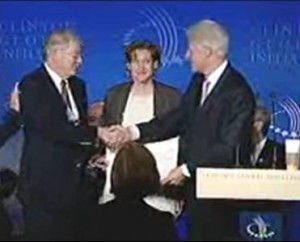Steve Rayner on Wired’s Smart List
September 30th, 2008Posted by: Roger Pielke, Jr.
My friend and colleague Steve Rayner, of Oxford University, was noted by Wired Magazine as one of 15 really smart people that should be informing the next president. I couldn’t agree more. Here is an excerpt from Steve’s commentary:
The only plausible way to curb emissions in the next few decades is to accelerate the development and adoption of low-carbon energy sources. Rather than setting targets for greenhouse gases, we should establish goals for installed technology, beginning with the most energy-intensive sectors, like electricity generation, ground transportation, and cement manufacturing. Similarly, international cooperation on emissions reduction should focus on the handful of countries responsible for the lion’s share of the problem. In the US and elsewhere, R&D funding should be directed toward technologies that otherwise might not come online for up to 20 years.
And if you want to read a fuller treatment of Steve’s views, check out his collaboration with Gwyn Prins titled The Wrong Trousers (PDF).




